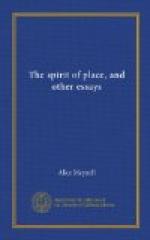The sign might have been a more manifest and a happier prophecy had this union of tenderness taken the gay occasion as often as the sad. Except at times, in the single case of Mme. de Sevigne, all three—far more sensitive than the rest of the world—were yet not sensitive enough to feel equally the less sharp communication of joy. They claimed, owned, and felt sensibly the pangs and not the pleasures of the absent. Or if not only the pangs, at least they were apprehensive chiefly in that sense which human anxiety and foreboding have lent to the word; they were apprehensive of what they feared. “Are you warm?” writes Marceline Valmore to her child. “You have so little to wear—are you really warm? Oh, take care of me—cover me well.” Elsewhere she says, “You are an insolent child to think of work. Nurse your health, and mine. Let us live like fools”; whereby she meant that she should work with her own fervent brain for both, and take the while her rest in Ondine. If this living and unshortened love was sad, it must be owned that so, too, was the story. Eugenie and Maurice de Guerin were both to die soon, and Marceline was to lose this daughter and another.
But set free from the condition and occasion of pain and sorrow, this life without boundaries which mothers have undergone seems to suggest and to portend what the progressive charity of generations may be—and is, in fact, though the continuity does not always appear—in the course of the world. If a love and life without boundaries go down from a mother into her child, and from that child into her children again, then incalculable, intricate, universal, and eternal are the unions that seem—and only seem—so to transcend the usual experience. The love of such a mother passes unchanged out of her own sight. It drops down ages, but why should it alter? What in her daughter should she make so much her own as that daughter’s love for her daughter in turn? There are no lapses.
Marceline Valmore, married to an actor who seems to have “created the classic genre” in vain, found the sons and daughters of other women in want. Some of her rich friends, she avers, seem to think that the sadness of her poems is a habit—a matter of metre and rhyme, or, at most, that it is “temperament.” But others take up the cause of those whose woes, as she says, turned her long hair white too soon. Sainte-Beuve gave her his time and influence, succoured twenty political offenders at her instance, and gave perpetually to her poor. “He never has any socks,” said his mother; “he gives them all away, like Beranger.” “He gives them with a different accent,” added the literary Marceline.




